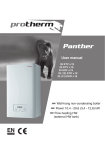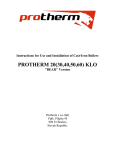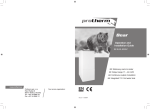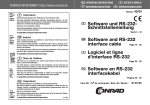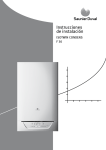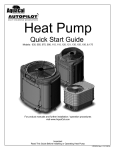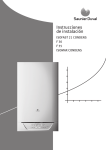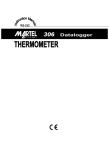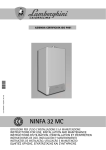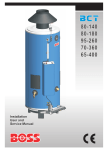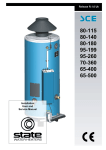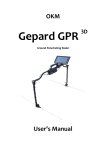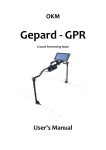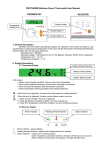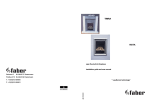Download UM-23MTV Gepard
Transcript
Gepard User manual 23 MOV v.19 23 MTV v.19 Wall-hang non-condensing boiler Power 8,5 - 23,3 kW Flow heating HW EN version CONTENTS STUDY THIS MANUAL CAREFULLY 1 Read me ..................................................................................................... 3 1.1 1.2 2 Commissioning the boiler ........................................................................... 3 2.1 2.2 2.3 3 Storing of documents........................................................................ 5 Explanation of symbols..................................................................... 6 Safety regulations....................................................................................... 6 4.1 4.2 5 Description of the device .................................................................. 3 Commissioning the boiler ................................................................. 5 Shutting down the boiler ................................................................... 5 Manufacturer’s documentation ................................................................... 5 3.1 3.2 4 Welcome........................................................................................... 3 User’s quick start manual ................................................................. 3 What to do if you smell gas? ............................................................ 6 Safety regulations ............................................................................. 6 Warranty / Obligations ................................................................................ 7 5.1 5.2 Warranty details ................................................................................ 7 Using the device / Obligations of the manufacturer .......................... 7 6 Recycling .................................................................................................... 7 7 Packing list ................................................................................................. 8 HOW TO USE THE BOILER 8 Using the equipment .................................................................................. 9 8.1 8.2 8.3 8.4 8.5 8.6 8.7 8.8 8.9 8.10 8.11 8.12 8.13 8.14 8.15 Overview........................................................................................... 9 Turning on and off............................................................................. 9 User settings..................................................................................... 9 Regulation of the boiler… ............................................................... 10 Boiler connection parameters ..........................................................11 Connecting the boiler to the CH, HW and gas piping ......................11 Operating pressure in the heating circuit ........................................ 12 Admitting water into the heating circuit ........................................... 12 Discharging water from the boiler ................................................... 12 Expansion tank ............................................................................... 12 Safety valve .................................................................................... 13 Hooking up gas............................................................................... 13 Operating sketch of 23 MOV .......................................................... 14 Operating sketch of 23 MTV ........................................................... 15 Air and exhaust lines ...................................................................... 16 -1- CONTENTS 8.16 8.17 Connecting the boiler to the electricity supply ................................ 21 Boiler wiring diagram ...................................................................... 23 NEED HELP? 9 Troubleshooting ........................................................................................ 24 10 Safety regulations..................................................................................... 26 11 Servicing and maintenance of the boiler .................................................. 26 11.1 11.2 11.3 Cleaning ......................................................................................... 26 Regular servicing ............................................................................ 26 Replacement parts ......................................................................... 26 12 Regulations .............................................................................................. 26 13 Converting to different fuel ....................................................................... 27 14 Contact your sales service centre ............................................................ 27 15 Available system pressure ....................................................................... 27 16 Technical parameters ............................................................................... 28 -2- STUDY THIS MANUAL CAREFULLY STUDY THIS MANUAL CAREFULLY 1.2 1 Read me We have prepared this User’s manual to help you start to use your equipment right away. 1.1 Welcome User’s quick start manual It is assumed in this manual that the equipment has been installed and commissioned by a qualified technician. This manual is part of the equipment and following installation it must be provided to the user in compliance with valid regulations. Study the handbook carefully to ensure a safe installation, safe use and proper service. We are not responsible for any damage resulting from failure to follow the instructions presented in this handbook. i Study closely the “Safety” and “Warranty” chapters, which contain important safety information. 4 5 3 6 mode 2 + – Gepard reset 1 1 2 3 4 5 6 RESET key MODE key Display " - " key " + " key Main switch 2 Commissioning the boiler 2.1 Description of the device GEPARD boilers are compatible with the usual types of hot water circuits and radiators. A network of service providers who meet the mentioned requirements work under contract to the manufacturer to commission the boilers and to provide warranty and after-warranty service. P2_GEPARD_usermanual_workbasis_EN_02-02/10-Protherm -3- STUDY THIS MANUAL CAREFULLY The boiler (as well as all its optional accessories) complies with the requirements of European Directive 90/396/EEC on gas-fuelled appliances and European Directive 92/42/EEC on efficiency, the European Directive 2006/95/EC on electrical means of operation for use in certain voltage ranges and the European Directive 89/336/EEC on electromagnetic compatibility. The appliance is also approved according to the European norms EN 677, EN 625, EN 60335-01, EN 50165, EN 55014, EN 61000-3-2 and EN 61000-3-3. In order to operate and handle the boiler in accordance with the purpose for which it is designed in actual conditions of use (hereafter referred to only as use), it is necessary to abide also by additional conditions – the most essential of which (i.e. those which must not be omitted) are found in the following regulatory documents: - in the design area: STN 06 0310 and STN 06 0830; - in the fire safety area: STN 92 0300; - for installation and fitting (and repairs): STN EN 1755 or STN 38 6460, as applicable STN 38 6462, Decree no. 48/1982 Coll. (as amended by the later prescriptions) and the binding occupational health regulations; - in time of running and operation: STN 38 6405; - in the area of discharge of combustion gases and air inflow STN EN 483, company material – “catalogue of dual piping for discharge of combustion gases and inflow of combustion air designated for type C gas appliances, i.e. in closed “TURBO” version. -4- The boiler is designated for operation within the normal AA5/AB5 environment in compliance with STN 33 2000-3 and STN 33 2000-5-51 (i.e. a temperature range of 5 – 40°C, temperature-dependent humidity to a max. of 85%). GEPARD boilers are suitable for the conditions of zones 1, 2 and 3, in rooms with a bath or shower and in washing areas as set out in STN 33 2000-7-701; they may not be installed in zone 0 (Fig.8). Before installation in the areas mentioned, protection against electric shocks must be provided for according to the same norms. The boiler complies with Ministry of Health Decree No 13/1977 Coll., i.e. on noise, for installation in residential and public areas. The boilers are built to operate with heating water, in compliance with STN 07 7401. (Above all, the water must never be acidic, i.e. its pH must be higher than 7 and it should have minimal carbonate hardness.) The requirements regarding the characteristics of domestic water are set out in STN 83 0616 (potable water STN 75 7111). With regards to water with total material concentrations of calcium and magnesium greater than 1.8 mmol/l, further “non-chemical“ measures against scale deposits (e.g. operation of magnetic water treatments in combination with settling equipment) are advisable. Silting up of the boiler with contaminants from the heating system or the settling of boiler scale on these disturbances, or on induced disturbances (e.g. silting up of the exchanger, pump breakdowns) are not covered by the boiler warranty. The distance from flammable materials (e.g. PVC, fibreboard, polyurethane, synthetic fibres, rubber etc.) must be P2_GEPARD_usermanual_workbasis_EN_02-02/10-Protherm STUDY THIS MANUAL CAREFULLY sufficient to keep the surface temperature of these materials below 80°C. The minimum working (unhindered) space in close proximity to the boiler must be such that the boiler can be worked with easily and safely with bare hands and with the usual hand tools; we recommend a minimum distance of 300 mm from up and under, 10 mm from side and a minimum of 600 mm in front of the boiler. - CH (heating) + HW (hot water) The GEPARD boilers supplies both central heating and hot water for the home. - Non-condensing boiler with exhaust vented to a chimney Model MOV must be fitted to a ventilation system (chimney). The boiler comes equipped with a safety device that shuts off the gas feed if the chimney becomes blocked. - Non-condensing boiler with forced extraction of exhaust. The MTV model is gas model fitted with a ventilation system for the intake of air and the venting of exhaust. Thanks to this ventilation system, the heater can be installed in any space. If the ventilator fails or if the chimney becomes blocked, the pressure switch shuts down the heater. The boiler must be installed and commissioned by a qualified technician. This ensures proper installation and operation in compliance with valid norms. If any maintenance, repair or adjustments concerning the gas are needed, a qualified technician must be called. PROTHERM has developed tailor-made accessories that will help you use your heater with maximum efficiency. P2_GEPARD_usermanual_workbasis_EN_02-02/10-Protherm 2.2 Commissioning the boiler Installation of the boiler and its first startup must be carried out by authorised service personnel only! If you wish to start the boiler after it has been commissioned, ensure that: - It is hooked up to the electricity supply - All the shut-offs and valves (CH, HW, gas) under the boiler are open - The CH pressure is within the recommended range of 1 – 2 bar. 2.3 Shutting down the boiler Turn off the master switch. If the boiler is to be shut down for an extended time, close all the valves (CH, HW, gas) underneath it. The shutdown must take into account the water temperature in the boiler and the outside temperature in the given season. If there is a danger of frost, drain all water from the boiler, the heating system and the hot water piping (see the paragraph 8.9 on page 12). 3 Manufacturer’s documentation 3.1 Storing of documents • This manual must be stored near the equipment to allow it to be accessed when needed. If you should move house, you must leave this manual near the device in order to allow the new owners to find it. • To ensure safe and efficient use of your boiler, study the instructions and observe them carefully We bear no responsibility for damages resulting from failure to observe the instructions. -5- STUDY THIS MANUAL CAREFULLY 3.2 Explanation of symbols a DANGER: Risk of injury. e DANGER: Risk of electric shock. b PCAUTION: Risk of damage to the equipment or its edge parts. i IMPORTANT: Useful information. 4 Safety regulations 4.1 What to do if you smell gas? If you smell gas: - Do not search for the leak with an open flame. - Do not turn on any electrical switches, telephones or any other devices that could spark an explosion. - Immediately open all windows and doors to ventilate the area. - Shut off the flow of gas at the safety valve. - Alert all other persons in the building. - Call from outside from your house the emergency assistance services of your gas supplier. 4.2 Safety regulations The following regulations and safety instructions must be observed: • Never tamper with the safety devices. -6- • Do not modify the equipment or its immediate surroundings, as this could affect the safe use of the boiler. • Do not under any circumstances destroy or remove the sealing from any of the parts. • Never carry out alone any maintenance or repairs to the equipment. Only qualified technicians may work with the equipment. • Be careful not to allow children to play with the boiler. • Do not plug or obstruct the ventilation system. Some home “improvements” may significantly affect the functioning of the boiler. Before carrying out any such intervention you must consult with the installer. • Do not site the equipment in excessive dampness. • Do not use and do not store explosive or flammable materials (e.g. gasoline/ petrol, aerosols, thinners, chlorinebased cleaning agents, paints, glues etc.) in the same space as the boiler. Under certain conditions these materials may be corrosive. • Do not touch the equipment surfaces - e.g. the ventilation pipes, hydraulic connectors and so on — even after the boiler has been turned off, as these surfaces may be hot. Touching these surfaces may lead to burns or scalding. • Be prudent when using the hot water tap. Water coming out of this tap may be scalding. This equipment contains metal parts (components). In working with it and in P2_GEPARD_usermanual_workbasis_EN_02-02/10-Protherm STUDY THIS MANUAL CAREFULLY cleaning it, particularly its corners, you must be careful. • If water leaks from the unit you must immediately turn off the cold water intake and the leak must be repaired by a qualified technician. • Do not store any objects on top of the equipment. 5 Warranty / Obligations 5.1 Warranty details PROTHERM’s Gepard boiler is covered by warranty as set out by the Warranty, Service log and other conditions listed in the service and installation manuals. 5.2 Using the device / Obligations of the manufacturer The above-specified warranty is valid if: - The equipment was installed by a qualified technician in accordance with the installation guidelines. inadequate servicing or incorrect hook up of gas or water. - Any type of damage to a system to which the equipment is connected. - Any type of damage caused by incorrect protection against freezing. - Any type of damage or faulty set-up caused by changes of character or pressure of gas or water or changes in electric voltage. • For further information please study the Conditions. a This equipment may be installed only in countries listed in the descriptive plaque. 6 Recycling Most of the boiler is comprised of recyclable materials. The equipment packaging must be properly recycled. - The equipment is used for domestic purposes and in compliance with the operation and maintenance instructions of the manufacturer. - All servicing, maintenance, repairs, dismantling of or working with the equipment during the warranty period is carried out by a qualified technician only. - Repairs or replacement of parts during the warranty period do not extend that period. The manufacturer bears no responsibility whatsoever for any damages resulting from: - Any type of damage arising from incorrect or incomplete installation, P2_GEPARD_usermanual_workbasis_EN_02-02/10-Protherm -7- STUDY THIS MANUAL CAREFULLY 7 Packing list 3 2 4 5 1 6 7 9 8 Legend 1 Boiler 2 Draw bar 3 Exhaust gas diffuser (only for MTV) 4 Sealing 5 Template 6 Butt-end of water intake 7 Butt-end of outlet valve 8 Service manual 9 Warranty -8- P2_GEPARD_usermanual_workbasis_EN_02-02/10-Protherm HOW TO USE THE BOILER HOW TO USE THE BOILER 8 Using the equipment 8.1 Overview 8.2 Turning on and off The boiler is turned on and off at the main switch, which is located on the control panel of the boiler. 8.2.1 Display icons When you turn on the boiler, the display shows the current status of the boiler: - if the boiler is not lit (do not heat HW eighter CH) - so called ˝stand-by˝ mode, the display shows the current water pressure in the heating system and tap symbol and radiator symbol on the left side of the display - while heating CH, the symbol flame is light in bottom left side and the radiator icon will begin to flash; the display will show the real-time CH water temperature - while heating HW, the upper right corner will show the flame icon and the water tap icon will begin to flash. The display will show the real-time water pressure in the system - if the pressure of the heating water in the system falls below 0.5 bar, the radiator symbol and current water pressure value begins flash together. If the pressure in the system falls furthest, then when pressure falls below 0.3 bar the radiator symbol and water pressure value 0.0 bar begins flash together. In this situation the system pressure must be topped up by letting in water. Once the pressure in the system reaches a value of 0.5 bar, display shows realtime status of the boiler again P2_GEPARD_usermanual_workbasis_EN_02-02/10-Protherm - if pressure rises above 2.4 bar, the real-time pressure reading begins to flash. In this case the water pressure in the heating system must be lowered by draining water. Once the system pressure falls below 2.4 bar the display will again portray the real-time status of the boiler. 8.3 8.3.1 User settings Choice of heating mode The GEPARD boiler can work in various modes: - heating mode - press the MODE key once. The display will portray the realtime pressure in the system and the radiator icon. In this mode the boiler heats only CH water; HW heating is locked out - SUMMER mode - press the MODE key twice. The display will portray the water tap icon and the real-time pressure in the system. In this mode, the boiler responds only to requests for hot water; the central heating is locked out - VACATION mode - press the MODE key three times. The display will show only the real-time pressure in the system and OFF symbol. In this mode, both hot water and the central heating are locked out. All the protective functions of the boiler are active. 8.3.2 Setting the hot water temperature Press the (+) or (-) key, and the tap icon will begin to flash and °C. Pressing the (+) or (-) keys sets the desired HW temperature anywhere in the range of 38 60°C, at one-degree increments. -9- HOW TO USE THE BOILER 8.3.3 Setting the temperature of the central heating water Press the (+) or (-) key, followed by the MODE key, and the radiator icon and °C will begin to flash. Pressing the (+) or (-) keys sets the desired CH temperature anywhere in the range of 38 - 80°C, also at one-degree increments. 8.4 from faulty setting of the boiler or room regulator. 8.4.3 The boiler will maintain the selected CH temperature. Boiler operation is interrupted (turned on and off) according to the internal temperature in the room in which the room regulator is located. Regulation of the boiler 8.4.4 8.4.1 Operating the boiler without a room regulator In this mode the boiler will maintain the chosen CH temperature. A room regulator is not connected; connection terminals have to be interconnected (supplied by the manufacturer). Set-up: - Press the main On/Off switch - Set the desired CH temperature on the control panel 8.4.2 Operating the boiler with a room regulator If a room regulator is used, the CH temperature must be restricted at the boiler control panel to the maximum recommended for your heating system (to avoid damage to your system), and which can also cover the thermal losses of the property at low outside temperatures. Heating of the central heating water can then be managed by the regulator, which will permit only that maximum CH temperature you have set at the control panel. Note: In spaces with a regulator there should be no thermostatic valves on the radiators. Caution: The manufacturer assumes no responsibility for damages resulting - 10 - On/OFF regulator Regulator with output modulation function selected The room regulator continuously regulates the boiler output into the heating circuit based on the indoors temperature. 8.4.5 Boiler operation with isothermal regulation The boiler regulates the CH temperature based on changes in the outside temperature. For this type of regulation it is necessary to use a regulator with an isothermal regulation function (Protherm Thermolink B, Thermolink P or Thermolink RC) and to connect it to the outside temperature sensor. Caution: Setting the maximum CH water temperature on the boiler control panel may influence the isothermal regulation. The CH water temperature selected at the boiler control panel is also the limiting temperature; The room regulator setting cannot override the heat limit temperature set at the boiler control panel. Setting an appropriate CH water temperature at the boiler control panel is one way to guard against exceeding the maximum allowed temperatures into the heating system (floor heating). Despite this, we recommend placing into the heating system a supplementary safety armature that will guard against a harmful increase in temperature. Caution: The room regulator and external sensor may be connected by authorized service personnel only. P2_GEPARD_usermanual_workbasis_EN_02-02/10-Protherm HOW TO USE THE BOILER Boiler connection parameters 8.5.1 82 65 116 65 82 Gepard 23 MOV 26 179 160 205 134 8.5 25 Ø1 742 205 8.6 410 8.5.2 The boiler connection terminals may not be placed under undue pressure from the piping system for the CH circuit, the HW circuit or from the gas intake. This assumes a precise observance of the dimensions of the endings of all connecting pipes, with regard to height as well as distance from walls and separation distances of the interconnected individual intakes and outlets. 311 Gepard 23 MTV Ø3 9 184 205 742 410 Connecting the boiler to the CH, HW and gas piping 311 P2_GEPARD_usermanual_workbasis_EN_02-02/10-Protherm The heating system circuit should be connected to the boiler in such a way that during repairs to the boiler the heating water need be released only from the boiler. During reconstructions, in adverse building arrangements and so on, the boiler may be connected to the CH heating system, the HW system and the gas inlet with flexible elements (hoses), but only those designated for this purpose. If flexible elements are used, these should be as short as possible and must be protected from mechanical and chemical stresses and damages. It must also be ensured that before the end of their life cycle or reliability in maintaining their parameters (according to their manufacturers’ data) they are always replaced by new ones. - 11 - HOW TO USE THE BOILER Note: The boiler includes filter which is situated below the HW flow sensor. You have to take out the HW flow sensor with filter to clean up the filter. 8.7 Operating pressure in the heating circuit The heating system (measured at the boiler) must be filled to a hydraulic pressure of at least 1 bar (corresponding to a hydrostatic height of water of 10 m.) The recommended pressure range is between 1 - 2 bar. 8.8 Admitting water into the heating circuit Bringing water into the heating system (small quantities only) can be done via the inlet valve on the boiler. A complete draining of water from only the boiler or the heating circuit and repeat filling must be carried out at inlet/outlet valves at appropriate locations in the heating circuit. Discharging and filling of water into the heating circuit and the subsequent operations (air venting, regulating the expansion tank) are not covered by the boiler warranty. If the HW in the boiler and piping is threatened with freezing, appropriate measures must be taken to avoid this entirely. Note: The release valve is located on the right side of the boiler at the pump. When filling the boiler the following conditions must be observed: - The water pressure on entry into the boiler must always be higher than the water pressure in the CH circuit. - Water is drawn into the boiler strictly in a cold state (CH temperature in the boiler up to 30°C). - The recommended water pressure in the cold boiler (up to 30°C) is between 1 – 2 bar. - The pressure in the expansion tank is checked and if necessary adjusted to the correct value (see technical parameters on end of this manual). 8.9 Discharging water from the boiler The outlet valve is designated primarily for lowering the water pressure in the boiler during repairs. Only a partial discharge of water from the boiler is possible through this outlet. - 12 - 8.10 Expansion vessel Before filling the CH system, check the pressure in the expansion chamber. The initial pressure in the expansion chamber should be greater by 0.2 bar than the static height of the water column of the heating circuit. Water may then be released into the CH system. Filling water pressure should be 0,2 – 0,3 bar higher than the pressure in the expansion chamber. Filling pressure is controlled from the cold state by the gauge on the water side after bleeding. P2_GEPARD_usermanual_workbasis_EN_02-02/10-Protherm HOW TO USE THE BOILER The valve for topping up the pressure in the expansion chamber is on the right side. Caution: Confirm that the expansion chamber is sufficient for the given quantity of water in the CH circuit (see the project installation documentation). 8.11 Safety valve The safety valve is located the underside of the boiler on the left of the hydraulic block. Draining from the safety valve may lead (if the maximum pressure in the system is exceeded) to the outflow of water or the escape of steam. For overflow that may emerge through the safety valve, it is therefore recommended to install a bleeder that feeds into the sewerage system of the property. 8.12 Hooking up gas The GEPARD version of the boiler is designated for operation with natural gas with a rated pressure in the piping system of 2 kPa, for which a heating value from 9 to 10 kWh/m3 is most often specified. The dimensions of the internal gas distribution piping and gas meter must be adequate to handle the other gas appliances of the user. Gas lines in buildings must be installed in compliance with STN EN 1775. Caution: It is recommended that the gas inlet into the boiler be tightened by fastening a union nut on the top face of the socket through the corresponding sealing (see the Packing list). a After completing the installation of the gas piping into the boiler the gastightness of the completed connection must be checked thoroughly. Caution: Do not under any circumstances manipulate the safety valve during the operation of the boiler. The safety valve furthermore may not be used for releasing water from the boiler or the heating system. The settling in the valve of detritus from the heating system is not covered by the warranty. P2_GEPARD_usermanual_workbasis_EN_02-02/10-Protherm - 13 - HOW TO USE THE BOILER 8.13 Operating sketch of 23 MOV 10 11 9 12 1 8 13 14 15 7 6 5 16 4 17 3 18 2 19 1 20 A Legend 1 Safety valve 2 Gas valve 3 HW exchanger 4 Discharge valve 5 Burner 6 Ignition electrodes 7 NTC CH water intake temperature sensor 8 Combustion chamber 9 CH exchanger 10 Exhaust gas collector 11 Combustion thermostat 12 NTC CH return water temperature sensor 13 Expansion tank 14 Ionising electrode 15 Pump 16 CH pressure sensor 17 3–way motor valve 18 HW flow sensor 19 HW filter 20 Inlet valve - 14 - B C A B C D E D E CH outlet HW outlet Gas inlet HW inlet CH inlet P2_GEPARD_usermanual_workbasis_EN_02-02/10-Protherm HOW TO USE THE BOILER 8.14 Operating sketch of 23 MTV 11 10 12 9 13 8 14 15 7 16 6 5 4 17 3 18 19 2 20 1 21 A B Legend 1 Safety valve 2 Gas valve 3 HW exchanger 4 Discharge valve 5 Burner 6 Ignition electrodes 7 NTC CH water intake temperature sensor 8 Combustion chamber 9 CH exchanger 10 Exhaust gas collector 11 Ventilator 12 Air manostat 13 NTC CH return water temperature sensor 14 Expansion tank 15 Ionising electrode 16 Pump 17 CH pressure sensor 18 3–way motor valve 19 HW flow sensor 20 HW filter 21 Inlet valve P2_GEPARD_usermanual_workbasis_EN_02-02/10-Protherm C A B C D E D E CH outlet HW outlet Gas inlet HW inlet CH inlet - 15 - HOW TO USE THE BOILER 8.15 Air and exhaust lines The type MOV is designed for combustion gases to be removed and discharged into a chimney (through a chimney inlet) with a minimum stabilised thrust of 2 Pa. The boiler is connected to the chimney inlet by a flue of a diameter corresponding to the size of the boiler’s gas exhaust outlet. It is forbidden to place inside the combustion gases exhaust ducting any objects which impair the combustion gases flow (e.g. various types of heat exchangers to utilise their residual heat). The combustion gases exhaust ducting is not part of the boiler accessories. Construction of the combustion gases exhaust ducting as well as that of the chimney must comply with relevant requirements. Compliance with the requirements specified by these standards will prevent undesirable phenomena from occurring, such as excessive cooling of the combustion gases, penetration of dampness into brickwork and fluctuations in the chimney thrust, and thus prevent undesirable effects on the boiler’s functioning. are installed where possible close to the passage where the exhaust exits the boiler. Breakdowns caused by leaking condensate are not covered by the boiler warranty. 8.15.1 Methods of air and flue gas ducting (according to STN EN 483) and permitted piping lengths If not described otherwise for the individual following methods of placing coaxial pipe routes and their drainages, the piping lengths (from connection at the boiler to the drainage) can be set as in the following cases. Note: One Em is considered as either a 1 m direct section or one 90° joint. Caution: If the lengths described for individual types are exceeded, the exhaust diffuser (orifice) must be removed from the ventilator drain. The following methods of air intake and exhaust venting are recommended for the boiler: The boiler takes combustion air from the space in which it is installed. Air must be supplied in sufficient quantity in accordance with applicable regulations. 8.15.2 The C12 method Venting of exhaust and drawing in of combustion air for the MTV type is done only through designated pipes. Length of fume ducting (23 MTV): The level sections of the piping slope at a gradient sufficient to let the condensation drain towards an outside area or towards a receptacle designed to draw off condensation. To achieve this, the elbow joint may be gently bent away from the straight section. The upright sections of the piping are always fitted with devices to draw off condensate. The devices for drawing off the condensate - 16 - Level routes and level venting into an open area. - 60 / 100: min. 0.3 m (with one 90° joint), max. 3 m (with one 90° joint).If the total fume ducting length is more than 0.5 m, the diffuser with a diameter of 39 mm must be removed. - 80 / 125: min. 0.5 m (with one 90° joint), max. 9 m (with one 90° joint).If the total fume ducting length is more than 1 m, the diffuser with a diameter of 39 mm must be removed. P2_GEPARD_usermanual_workbasis_EN_02-02/10-Protherm HOW TO USE THE BOILER An example of a level coaxial pipe route: version C12 (complies with STN EN 483) 8.15.4 The C42 method Connecting to a double shared chimney. 8.15.3 The C32 method Vertical routes and vertical venting into an open space. Length of fume ducting (23 MTV): - 60 / 100: min. 1 m (with one 90° joint), max. 4 m (with one 90° joint). If the total fume ducting length is more than 1.5 m, the diffuser with a diameter of 39 mm must be removed. - 80 / 125: min. 1 m (with one 90° joint), max. 10 m (with one 90° joint). If the total fume ducting length is more than 1.5 m, the diffuser with a diameter of 39 mm must be removed. An example of a vertical coaxial pipe route: version C32 (complies with STN EN 483) Double piping from independent boilers (independent routes) can feed into shared chimneys; the transport capacity of the chimney is judged according to the manufacturer’s data on the chimney. If the pipes are set into the chimney in two directions and vertically aligned, there must be a vertical separation between the outlets of at least 0.45 m. Where two outlets vent towards each other, they must be separated by a minimum vertical distance of 0.6 m. The exhaust piping into the shared double chimney never has terminal elements — the same as with pipes that vent into open areas! Both components of the route — external (air) and internal (exhaust gas) — must safely feed into the relevant chimney duct but not protrude so deeply that they create blockages in the exhaust or air ducts. Length of fume ducting (23 MTV): - 60 / 100: min. 0.3 m (with one 90° joint), max. 3 m (with one 90° joint). If the total fume ducting length is more than 0.5 m, the diffuser with a diameter of 39 mm must be removed. P2_GEPARD_usermanual_workbasis_EN_02-02/10-Protherm - 17 - HOW TO USE THE BOILER 8.15.6 The C82 method Using piping in cases where the air is drawn in from an open area and the exhaust vents into a shared chimney. Length of fume ducting (23 MTV): 8.15.5 The C52 method - 80 / 80: min. 2 x 0.5 m, max. 2 x 18 m. If the total fume ducting length is more than 2 x 2 m, the diffuser with a diameter of 39 mm must be removed. Separate double piping and venting into different areas (with different parameters, mainly of pressure) For venting exhaust and bringing in air for combustion, separate piping may be used. The separate piping may not be routed on opposing walls of the building. Length of fume ducting (23 MTV): - 80 / 80: min. 2 x 0.5 m, max. 2 x 18 m. If the total fume ducting length is more than 2 x 2 m, the diffuser with a diameter of 39 mm must be removed. Air may in the same way be brought in from an open space (or a space well - 18 - P2_GEPARD_usermanual_workbasis_EN_02-02/10-Protherm HOW TO USE THE BOILER supplied with air) and exhaust extracted into a common chimney (or, again, into a space with common venting of exhaust gases). The special case of B22 also belongs in this category. (See following text.) 8.15.7 The B22 method Extraction of exhaust (also in separate piping) into an open area and intake of combustion air from an internal space in the building in close proximity to the boiler (in coaxial piping with the perforation of its outer part). Length of fume ducting (23 MTV): - 80 / 80: min. 2 m, max. 2 m. The diffuser must be removed. When drawing in air for combustion from internal areas of the building, a sufficient quantity of that air must be ensured. No other appliance may be connected to the exhaust duct (whether chimney or pipe), and when drawing in air at least 1.2 m3 of air/hour per kW of boiler output must be available. towards the boiler at a nominal gradient of 3 percent. A device for drawing off condensate must be placed on the piping as close as possible to the boiler. 8.15.9 Examples of flue duct placements according to Appendix No 7 of the Government Regulations of the SR No 92/1996 Coll. - Independent apertures in a flat wall Independent aperture creates a zone from the axis of the aperture of a width a = 0.5 m, radius b = 1.0 m and height c = 5.0 m. Sketch of the zone created by an independent aperture of an exhaust stack If the axis of the aperture is at a distance d > 0.3 m below the upper part of the window frame, the zone may not extend to the window surface. At distances d ≤ 0.3 m, the protective zone of radius b may extend to the upper part of the window. Sketch of the zone from the axis of the aperture of the exhaust stack sited close to the upper part of the window 8.15.8 Piping gradient The layout of the piping must permit a down-gradient of the exhaust piping P2_GEPARD_usermanual_workbasis_EN_02-02/10-Protherm - 19 - HOW TO USE THE BOILER The minimum distances for double apertures set vertically in a flat exterior wall are: a = 0.5 m; b = 1.0 m; c = 5.0 m, a1 depending on x as follows: x ≥ 5.0 m, then a1 = 0.5 m, x ≥ 4.0 m, then a1 = 0.6 m, x ≥ 3.0 m, then a1 = 0.75 m, x ≥ 2.0 m, then a1 = 1.0 m, x ≥ 1.0 m, then a1 = 1.2 m, - Dual apertures set level in a flat exterior wall Dual apertures set vertically in a flat exterior wall Distances of dual apertures set level with each other in a flat wall are: a = 1.5 m; g = 5.0 m; c = 5.0 m. If g < 5 m, an intersection zone occurs, making it necessary to maintain the total 8 m width of the zone and also increase the “a» values proportionally on both sides (e.g., if g = 4.0 m, then a = 2.0 m). Dual apertures set level in a flat exterior wall Important warning! The examples cited for placing exhaust ducts can be used only in repairs or reconstructions of properties. - Dual apertures set vertically - 20 - Other cases must be approached as set forth in Decree No 410/2003 of the Slovak Ministry of the Environment, which amends and supplements Decree MoE SR No 706/2002 Coll. on Air pollution sources, on Emission limits, on Technical requirements and general operating conditions, on the List of toxic substances, on the Classification of air pollution sources and on Requirements for ensuring the dispersion of hazardous substances. P2_GEPARD_usermanual_workbasis_EN_02-02/10-Protherm HOW TO USE THE BOILER 8.15.10 Safety measures The distance of flammable materials from the exhaust component of the separate piping must be enough to ensure that the temperature at the surface of these materials is no higher than 80°C. Exhaust may not be vented in areas: • where a danger of explosion is present (as set forth in STN 33 2320) • that are interior areas of a building (lofts, halls, stairwells etc.) • closeable, i.e. passages or gateways etc. • that descend underground (even if these remain open to the surroundings and free of obstructions), e.g. tunnels, underpasses etc. These basic injunctions for venting exhaust must always take adequate account of where independent air intakes are sited. Wall apertures for coaxial piping for drawing in air and venting exhaust are cut to the appropriate size (approx. 120 to 150 mm) and sealed (with building construction methods) following the installation. Non-flammable materials (with Degree A of flammability according to STN 73 0823) must be used for sealing, e.g., masonry mortar, plaster etc. Openings in combustible walls or roofs must be made according to the first section of this part. 8.16 Connecting the boiler to the electricity supply Hooking up the boiler to the mains voltage is done through a triple-wire plug with a flexible cord. The socket for connecting the boiler to the electrical network must comply with STN 33 2000-4-46. It must always have the protective ground (pin) P2_GEPARD_usermanual_workbasis_EN_02-02/10-Protherm reliably connected with the PE or PEN wire (a combination of green and yellow colours). The boiler must always be connected through its main to the ground and must always be installed in a way that allows access to the socket and plug. The use of a variety of “adaptors”, “extension cords” etc. is not permitted. Caution: The preparation of plugs and sockets as well as room regulator connections that extend into the interior electrical components of the boiler must under all circumstances be carried only by a person with electrotechnical qualifications as set forth in Decree No. 50/1978 Coll. In the same way, servicing of the electrotechnical components may be carried out only by a person with the above-mentioned professional qualifications. Before servicing the electrotechnical elements the boiler must be disconnected from the current by pulling the mains lead from the socket! The main body of the boiler is protected by a tube fuse (T 2A / 250 V), which is located on the boiler control board. For regulating the boiler from a room regulator, only a regulator that has a novoltage input, i.e. that does not send any external voltage into the boiler, may be used. Load carrying capacity of the regulator with a relay switch is 24V / 0.1 A. The room regulator must be connected to the boiler with a two-wire plug. The recommended cross-section for the room regulator connection (copper lead) is 1.5 mm2. Leads for connecting the room regulator may not be coaxial with the mains voltage leads. The terminal for hooking up the room regulator with the relay switch is supplied - 21 - HOW TO USE THE BOILER by the manufacturer with a connector and is located in the frame of the boiler control panel. Room regulators may be connected to the GEPARD boiler via eBUS communication. For this type of equipment, however, we recommend installing only Protherm Thermolink B, Thermolink P or Thermolink RC regulators. Only in this way can the manufacturer guarantee the optimal functioning of the boiler. The room regulator leads are connected to the terminal board of the boiler. By means of the above-mentioned regulators the isothermal regulation function can be activated. All settings for isothermal curves are carried out with the aid of the room regulator. Note: To activate the isothermal regulation the external temperature sensor must be installed. The external sensor lead is connected to the terminal board of the boiler. The external sensor is placed on the coldest wall of the property (most often the northern wall). Caution: The room regulator lead and the external sensor may not be coaxial with power cables (230 V current etc.). - 22 - P2_GEPARD_usermanual_workbasis_EN_02-02/10-Protherm HOW TO USE THE BOILER 8.17 Boiler wiring diagram 5 X31 X51 X40 4 6 7 X32 8 3 9 X90 10 X30 X15 2 X2 1 X25 20 19 18 17 16 15 14 13 12 11 10 9 8 7 6 5 4 3 2 1 X17 5 4 3 2 1 1 2 3 4 5 6 7 8 9 X16 X12 FUS X11 10 9 8 7 6 X101 1 2 10 11 12 13 14 15 16 17 18 3 4 X20 X21 X14 X13 11 X17 NTC X2 X20 20 19 18 17 16 15 14 13 12 11 10 9 8 7 6 5 4 3 2 1 1 2 3 4 3 2 1 4 5 6 X21 1 2 3 4 5 6 7 8 9 1 2 10 11 12 13 14 15 16 17 18 3 4 4 3 1 2 3 1 2 2 1 1 D 18 17 N L 230 VAC M 24 V Ebus 16 1 1 T 14 15 Legend 1 Regulation connector 2 Exalink connector 3 NTC solar connector 4 Alternative 24V connection 5 User interface 6 Hydraulic connector 7 Gas valve 8 Ventilator 9 Fuse 10 230 V connection 11 Pump 12 Electrodes 13 NTC CH water intake temperature sensor P2_GEPARD_usermanual_workbasis_EN_02-02/10-Protherm 14 15 16 17 18 19 1 1 1 2 1 T 13 12 NTC CH return water temperature sensor Thermal fuse NTC CH flow sensor NTC HW flow sensor 3–way motor valve CH pressure sensor - 23 - NEED HELP? NEED HELP? 9 Troubleshooting This section contains all possible error codes together with the appropriate solutions that the USER MAY carry out to restore the boiler to operation — corrective measures. Other error codes MUST be dealt with by a qualified technician. The external sensor is placed on the coldest wall of the property (most often the northern wall). When displaying an error code a telephone icon and the letter F will flash on the display together with the relevant error code. During the normal course of operation of the device the ten most recent error alarms can be displayed by simultaneously pressing for seven seconds both keys for setting the CH temperature. Code Description F0 Failure of NTC CH intake water temperature sensor F1 Failure of NTC CH water return temperature sensor F2 Failure of NTC HW sensor F3 Failure of NTC accumulator F4 Disruption of NTC collector F5 Failure of air supply sensor F6 Failure of draw sensor F7 Disruption of NTC HW return from solar sensor F8 Failure of NTC accumulator sensor ground F9 Failure of NTC exhaust hood sensor F10 Short circuit in NTC CH intake water temperature sensor F11 Short circuit in NTC CH return water temperature sensor F12 Short circuit in NTC accumulator sensor ground Short circuit in NTC CH sensor F13 Short circuit in NTC accumulator sensor F14 Short circuit in NTC collector sensor F15 Short circuit in air supply sensor F16 Short circuit in draw sensor F17 Short circuit in NTC HW return from solar sensor F18 Short circuit in NTC accumulator sensor ground F19 Short circuit in NTC exhaust hood sensor F20 Safe temperature limiter is active: Cut off due to overheating F21 Boiler locked out – threshold values exceeded F22 Low water in boiler – pump locked out F23 Low water level: high temperature difference between outlet and inlet NTC - 24 - P2_GEPARD_usermanual_workbasis_EN_02-02/10-Protherm NEED HELP? Code Description F24 Low water level: rapid temperature rise F25 High flow temperature F26 Incorrect flow value from stepmotor gas valve F27 Flame sensing error – ionisation signal contrary to closed gas valve F28 Failure to light burner at first attempt F29 Loss of flame during burner operation F30 Failure of lock-out sensor F31 Short circuit in lock-out sensor F32 Anti-freeze protection valve is active: ventilator rotations are outside tolerance limits F33 Anti-freeze protection valve is active: Pressure sensor is not on Pressure sensor is not off (when the ventilator is not running) F35 Flue system error F36 Draft detected (chimney version only) F37 Ventilator rpms during operation are outside tolerance limits F38 Measured frequency limit is outside tolerance limits F39 Error in boiler auto-detection F41 Incorrect gas regulation F42 Problem with coding resistor F43 Incorrect value for boiler variant F49 Low eBus voltage F55 Error in CO sensor F58 No feedback from preheater F60 Error gas valve + F61 Error gas valve - F62 Error – gas valve turned off F63 EEPROM error F64 ADC error F65 High electronics temperature F66 Error in IIC collectors F67 Flame signal from ASIC is unreliable Detected flame input signal is outside range (0 or 5V) F70 Incorrect DSN F71 Flow sensor permanent failure F72 Lengthy interval between flow sensor and NTC CH return water sensor F73 CH pressure sensor not connected or short circuited F74 CH pressure sensor has electrical fault (or damaged cable) P2_GEPARD_usermanual_workbasis_EN_02-02/10-Protherm - 25 - NEED HELP? Code Description F75 Permanent failure CH pressure sensor. No rise in pressure detected following pump start F76 Thermal fuse failure in primary exchanger F80 Error in SHE entry sensor F81 Error in charger pump F82 Error in anode tester F90 Not connected to APC module F91 Error in APC module sensor • When error codes displayed, press RESET key. If following this measure the equipment still does not work, contact a qualified technician. 10 Safety regulations Insert technical content about the safety devices of the appliance such as frost protection, safety valves, etc... 11 Servicing and maintenance of the boiler 11.1 Cleaning a Turn off the device before cleaning The boiler cover may be cleaned with a gentle liquid cleaner and damp cloth, then wiped with a dry cloth. i Do not use abrasive cleaners or solvents as these may harm the paintwork. 11.2 Regular servicing Regular servicing is very important in extending the lifecycle and safe and efficient use of your device. - 26 - b Incorrect or inappropriate servicing may negatively impact the safe operation of the equipment and may result in injury. We recommend annual servicing of the equipment. • Always call in a qualified technician. 11.3 Replacement parts To ensure safe operation and a lengthy lifecycle for the product, you must use only original parts from the manufacturer. 12 Regulations In practice there may arise situations in which you must take the following unavoidable measures: • Protect against (even the accidental) starting up of the boiler during inspection and work on the exhaust gas, gas and water piping by shutting off the electricity supply to the boiler in ways other than by merely turning off the boiler at the main switch (e.g. by pulling the boiler plug from the electrical socket), • Always shut down the boiler when flammable or explosive vapours are detected (even temporarily) in the areas from which the boiler draws in air P2_GEPARD_usermanual_workbasis_EN_02-02/10-Protherm NEED HELP? for combustion (e.g. from oils for mixing paints, the spreading and spraying of molten materials, gas leaks etc.), • If water must be discharged from the boiler or from the circuit, it must not be dangerously hot • If water leaks from the boiler exchanger or if the exchanger fills with ice do not attempt to start the boiler until normal conditions for boiler operation are restored. 13 Converting to different fuel The Gepard boilers are in their basic versions designed to use natural gas as fuel. The modifications required to switch to a different fuel must be carried out by an authorised technician with a valid manufacturer’s certificate. For conversion to propane use the conversion kit for switching from natural gas to propane gas. The kit contains all necessary parts and instructions on how to perform the conversion. 14 Contact your sales service centre If gas leaks, there is a failure in supply or if you suspect the same, shut down the boiler and gas intake and immediately contact the gas company or service centre. 15 Available system pressure 1 2 3 4 A 600 500 400 300 200 100 0 0 500 Legend 1 Pump at setting 1, by-pass at factory setting 2 Pump at setting 2, by-pass at factory setting 3 Pump at setting 1, by-pass closed 4 Pump at setting 2, by-pass closed P2_GEPARD_usermanual_workbasis_EN_02-02/10-Protherm 1000 A B B Available system pressure (mbar) Flow through the heating system (l/h) - 27 - NEED HELP? 16 Technical parameters Description Units GEPARD 23 MOV Gas category II2H3P Distribution B11BS Ignition electronic Power / fuel natural gas propane Maximum thermal consumption kW 25,8 Minimum thermal consumption kW 10,4 Maximum thermal output kW 23,3 Minimum thermal output kW 9,0 Efficiency % 89,9 Maximum gas consumption m3/h 2,73 Minimum gas consumption m /h 1,10 Maximum gas consumption kg/h 2,64 Minimum gas consumption kg/h 1,13 3 NOx classification 3 Gas pressure Inlet pressure mbar 20 37 mm 5,8 4,4 Maximum pressure in discharge nozzles mbar 11,4 27,8 Minimum pressure in discharge nozzles mbar 2,2 5,0 mm 1,20 0,73 Membrane diameter Discharge nozzle diameter Heating Maximum working pressure bar 3 Minimum working pressure bar 0,5 Recommended operating pressure bar 1-2 Temperature range °C 38 - 80 Expansion tank l 5 mbar 3 bar 10 Minimum pressure bar 0,5 Minimum HW flow l/min 1,7 Maximum pressure in the expansion tank Hot water Maximum pressure - 28 - P2_GEPARD_usermanual_workbasis_EN_02-02/10-Protherm NEED HELP? Description Units GEPARD 23 MOV Quantity of HW drawn (at ∆T 30°C) l/min 11,1 °C 38 - 60 V/Hz 230/50 W 92 Temperature range Electrical data Voltage / frequency Consumption Electrical casings Current IPX4D A Exhaust venting method Fume ducting diameter 0,4 chimney mm 126 Exhaust gas temperature °C 110 Quantity of exhaust gas produced g/s 21,0 Noise dB < 50 Dimensions: height / width / depth mm 740 / 410 / 298 kg 31 Weight without water P2_GEPARD_usermanual_workbasis_EN_02-02/10-Protherm - 29 - NEED HELP? Description Units GEPARD 23 MTV Gas category II2H3P Distribution C12, C32, C42, C52, C82, B22 Ignition electronic Power / fuel natural gas propane Maximum thermal consumption kW 25,0 Minimum thermal consumption kW 10,7 Maximum thermal output kW 23,3 Minimum thermal output kW 8,5 Efficiency % 93 Maximum gas consumption 3 m /h 2,64 Minimum gas consumption m3/h 1,13 Maximum gas consumption kg/h 1,9 Minimum gas consumption kg/h 0,8 NOx classification 3 Gas pressure Inlet pressure Membrane diameter mbar 20 37 mm 5,95 4,20 Maximum pressure in discharge nozzles mbar 12,2 28,1 Minimum pressure in discharge nozzles mbar 2,4 5,1 mm 1,20 0,73 Discharge nozzle diameter Heating Maximum working pressure bar 3 Minimum working pressure bar 0,5 Recommended operating pressure bar 1-2 Temperature range °C 38 - 80 l 5 mbar 3 Maximum pressure bar 10 Minimum pressure bar 0,5 Minimum HW flow l/min 1,7 Expansion tank Maximum pressure in the expansion tank Hot water - 30 - P2_GEPARD_usermanual_workbasis_EN_02-02/10-Protherm NEED HELP? Description Units GEPARD 23 MTV Quantity of HW drawn (at ∆T 30°C) l/min 11,1 °C 38 - 60 V/Hz 230/50 W 147 Temperature range Electrical data Voltage / frequency Consumption Electrical casings Current IPX4D A Exhaust venting method Fume ducting diameter 0,4 turbo mm 60 / 100 , 80 / 125 , 80 / 80 Exhaust gas temperature °C 122 Quantity of exhaust gas produced g/s 13,4 Noise dB < 50 Dimensions: height / width / depth mm 740 / 410 / 298 kg 34 Weight without water P2_GEPARD_usermanual_workbasis_EN_02-02/10-Protherm - 31 - Protherm spol. s r.o. Pplk. Pľjušťa 45 909 01 Skalica Tel.: 034 6966 101 fax: 034 6966 111 P2_GEPARD_usem r anua_ lworkbassi_EN_00 2-2/10 Insert the bar code www.protherm.eu




































